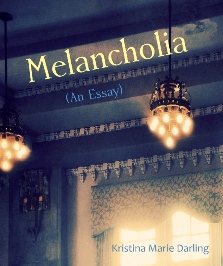Melancholia (An Essay) by Kristina Marie Darling
 Melancholia (An Essay)
Melancholia (An Essay)
by Kristina Marie Darling
Ravenna Press, 2012
72 pages / $10 Buy from Ravenna Press
Parenthetically titled “An Essay,” Kristina Marie Darling’s Melancholia is a collection of prose poems, independent lines, notes, and fragments. Prose poetry and essays are not imperfect bedfellows. Samuel Johnson defined the essay form as “A loose sally of the mind: an irregular indigested piece; not a regular and orderly composition.” His definition sounds appropriate to the form’s modern originator, 16th century French writer Michel de Montaigne, whose works unfold as scattered meditations on words and concepts. Yet Johnson’s definition is also curiously apt as a description of contemporary prose poetry. Often lacking a central narrative, prose poems typically contain development of breadth rather than depth. Darling solves that problem by using the prose poem form to link imagistic snapshots that accumulate the work’s emotional content.
Yet Melancholia is difficult to classify. Its structural form is prose poetry, its conceptual mode is almost filmic, and its narrative mode owes much to the essay’s tendency to classify and define. Melancholia posits that a poet-narrator is a good choice to “select and omit”: Darling’s prose poems are more concerned with absence than presence, as white space outweighs text within the book. Such ratio is not shocking in a volume of poetry, but the prose poetic form reestablishes the physical page in poetry. When a poet reaches for the margins in her sentences, her later abbreviations become more obvious. Darling has a nice sense of the physical page, and Ravenna Press’s pocket series, at roughly 6 by 5 inches, is the right size for a typographically spare collection.
Darling’s complicated form mirrors her complicated content. Melancholia documents a fragmented relationship in a previous, possibly Victorian, era. Time is ambiguous in the collection: although the overarching narrative occurs in an epoch of cufflinks and corsages, the work references a “little-known French film, in which the heroine makes her living by keeping nightingales,” and another, equally obscure film, where “a woman refers to her beloved as a ‘strange machine.’” This confusion about time arises from the poet’s role as essayist. Darling’s core narrative is centered on a feuding, and later separated, couple, but she overlays that narrative with fragments of fact. Her reason for bending form is tied to her title: melancholy lacks the sharp edges of anger and sadness. It is a paradoxical feeling of heft and weightlessness, so a poet would be smart to mix poetry and fact as she struggles to understand pain.
January 14th, 2013 / 12:00 pm
Cinema x 3: Melancholia, The Tree of Life, Feature Friday
1.
You no doubt read Greg Gerke’s deeply critical post about Lars von Trier’s Melancholia. Curtis White has now posted his own much more positive impressions of the film. I’ve tried convincing the two of them to go at it like me and Chris Higgs—I even introduced them during AWP—but they’re being too polite. Chime in in the comments section, demanding blood!
2.
Martin Seay is currently posting a series on Tree of Life; the first part went up yesterday, and part 2 is supposedly forthcoming today. (Meanwhile, don’t miss Martin’s meditations on Anonymous.)
(My own thoughts on Tree are here. I have nothing to say about Anonymous.)
3.
Every Friday at Big Other, I’m posting links to feature-length films that are up at YouTube. And I’m doing it for you!
Lars Von Trier’s Melancholia: Homage Without Artistry
In the opening extreme slow-motion shots (the only appetizing thing in the Melancholia, though these brief scenes seem to be leftovers of his style in Antichrist), Lars Von Trier pays homage to no less than four masters: Ingmar Bergman (the close-up of Kirsten Dunst), Alan Resnais’s Last Year at Marienbad (the giant hedge garden, with tree shadows this time), Stanley Kubrick’s 2001: A Space Odyssey (the slow planetary movements to classical music), all of Andrei Tarkovsky, but specifically Solaris (the Breughel painting) and The Mirror (objects falling in slow-motion, a fire seen through a window)—the end of the world scenario while people bob and weave around an opulent country house is right out of Tarkovsky’s The Sacrifice. Von Trier’s whole opening sequence mirrors the opening to his Antichrist (using Handel’s music instead of Wagner) which scintillatingly displayed intercourse and the death of a child. One can only hope that Von Trier will go beyond homage and create something compelling, but it is not to be.

